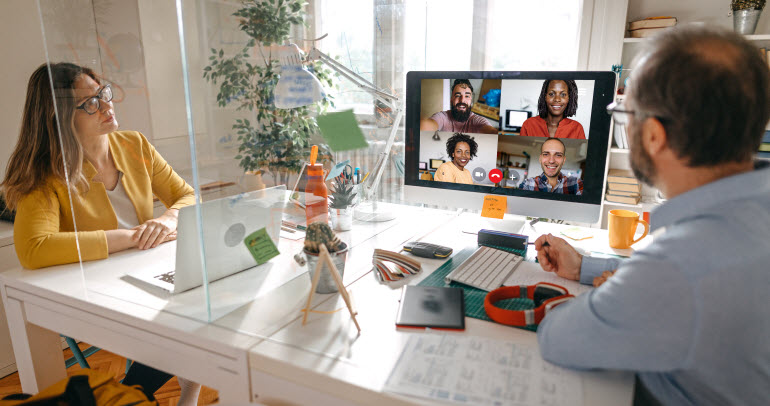
COVID-19 has continually challenged our lives and how we conduct in-person business. Many industries have found ways to make it work with the help of technology. This is particularly true for our clients who want to conduct qualitative research. How we can make it work and provide effective insights while keeping our clients and participants safe has been one of our top priorities.
Setting Priorities
We engage with thousands of people each year as we conduct research around the world. In many cases, we are privileged to meet with participants in-person, as we conduct ethnographies in their homes or invite them to research facilities to tell their stories and discuss their needs. In some cases, particularly when fielding health-related studies, we come into contact with those who are among the most vulnerable to viral and respiratory infections.
In March of 2020, when COVID-19 turned the US and the rest of the world upside down, our team at Escalent gathered to discuss the key needs and priorities for how we would handle the developing travel restrictions and fielding challenges that would emerge if the situation escalated. The priority for every team member was simple and unanimous: We will not put clients and participants at risk. There is no research objective that outweighs personal safety.
In collaboration with our clients, we put approaches in place that limit the need for respondents to participate in in-person research.
Meeting the Challenge
The fact remains that despite, and in some cases, because of, the obstacles COVID-19 has put in our way, there are critical business challenges that need to be addressed for many companies, so we consistently revisit and adapt our approaches in response to the evolving situation.
- Leveraging Technology: While not every country and market has fully adopted the use of webcam interviews or online boards for research, these circumstances present a unique opportunity to demonstrate the technology’s value and explore larger-scale feasibility. We are utilizing a combination of online discussion boards and webcam interviews for many of the projects that we would traditionally conduct in-person. We work with our international partners to recruit appropriately, educate respondents and refine our engagement strategies to maximize completions.
- Evolving the Debrief: For our client teams that thrive through live, backroom discussion, it is difficult to imagine the same immersion in global research without the “boots on the ground” element. We’ve opted to take many of the same engagement strategies that keep our remote teams connected and use them to help our clients stay connected to the research. From simple tactics such as carefully scheduled calls (to address conflicting time zones) to creative options such as using asynchronous online boards (to allow teams to post questions, collaborate on stimuli updates and share their learning), we are working closely with our client teams, translators and international moderators to bring global research home.
- Collaborating Virtually: While it’s difficult to replace in-person engagements, we’ve found that a well-facilitated session using a virtual collaboration platform yields impressive results. We’ve combined aspects of gamification with interactive exercises and informative, eye-catching visuals to create a participant- or client-collaboration environment that is as effective as if we were face-to-face.
For any in-person research (regardless of industry or audience), we require our research facility partners to commit to following our in-person research protocol, which we developed in partnership with the Cleveland Clinic. Some of the highlights include:
- Screening participants for symptoms of acute respiratory illness (e.g., fever, cough, difficulty breathing) before entering the facility
- Offering tele-web interviews with flexible hours and availability to any participants who are not comfortable coming in, may have been exposed to COVID-19, or report potential symptoms of infection
- Providing an isolated waiting area for participants or staff who exhibit COVID-19-related symptoms
- Elevating the degree of cleaning and sanitization of all high-contact surfaces, interview rooms, waiting areas, backrooms, restrooms and public areas
- Requiring sick employees to stay home, particularly those who develop respiratory symptoms
Finding A Way to Move Forward
The research industry has encountered and dealt with many crises over the years that have impeded travel, such as natural disasters, political upheaval and international conflict. And, while timelines may shift, we always find a way to gather the insights needed to drive critical decision-making for our clients.
While qualitative research helps us to deeply understand peoples’ lives, thoughts and behavior, we must ensure that our research design, practices and logistics always keep our participants and employees safe. On the average day, this is important out of respect for their time and effort—but in the midst of a health crisis, it is essential for their safety and well-being.
Send us a note if you would like to discuss how to keep your global research moving amid these challenges, and leverage our creative strategies for fielding and engagement.









